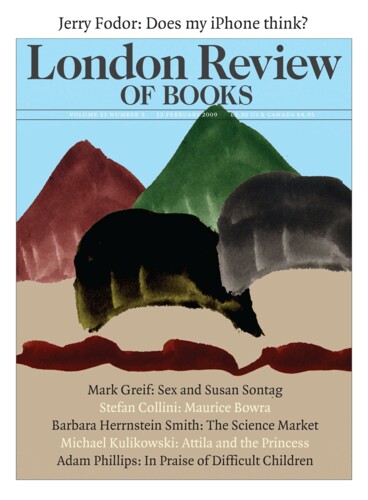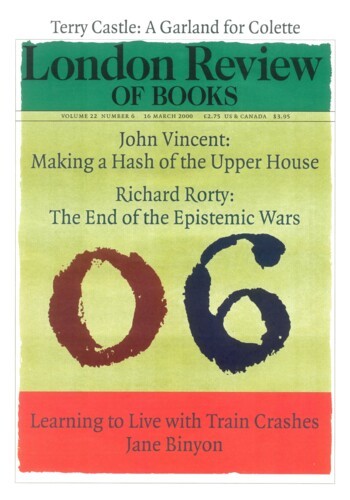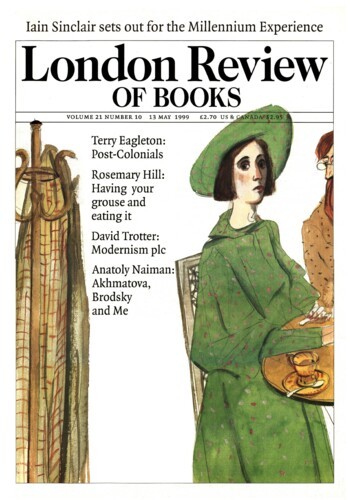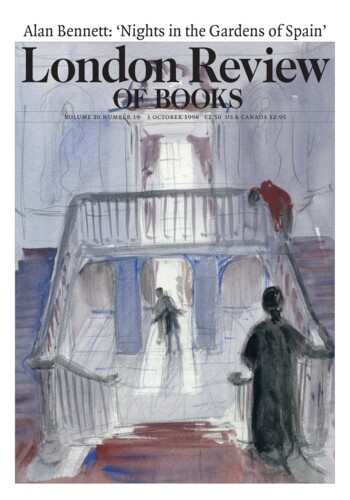A.N. Wilson
A.N. Wilson is the author of many works of fiction and non-fiction.
‘I’ll crush you with my Daimler!’
A.N. Wilson, 16 March 2000
There’s a moment in this book – some time in the 1960s – when Christopher Logue and Adrian Mitchell have been asked to Hintlesham Hall in Suffolk to do a poetry reading. They ring the doorbell and a liveried footman tells them that they should go to the servants’ entrance. ‘I said, let’s leave. “No,” Adrian said. “We’ve come all this way. We’ll earn our money.” ’ They are given high tea in the servants’ hall: two pieces of Spam, sliced bread, margarine, an apple, a piece of seed cake. Water and/or tea to drink. When they are finally invited in to read, ‘Adrian and I decided to give our best … We read. By best, we meant bluntest. I added a number of “fucks” and “cunts” to otherwise quite decorous poems. Then we left.’’‘
Going Native: Theroux’s Portrait of Naipaul
A.N. Wilson, 13 May 1999
I have been trying to explain to myself how such a book as this held my uninterrupted attention from first to last. I read it almost at a sitting. This was certainly not because of any previous obsession with either V.S. Naipaul or Paul Theroux. True, I regard Naipaul as one of the most enthralling writers of our time, even though the subjects he has covered – India, Africa, the putrefaction of the post-colonial world – are not ones which engage my interest or my imagination. It is him writing about them, rather than these places themselves, which fascinates me. For this reason, I regard as almost his most triumphant book the one which his true disciple, Paul Theroux, thinks marks the great falling-off: The Enigma of Arrival. This is a book about Naipaul having stopped writing. He is living in Wiltshire within a stone’s throw of a large house in which a scarcely-disguised Stephen Tennant is, like England, gathering dust and going to seed. Nothing happens in the book, yet the writing is hypnotic.’
Sparrow v. Rowse
1 October 1998
This Trying Time: John Sparrow
A.N. Wilson, 1 October 1998
John Hanbury Angus Sparrow (1906-92) was a devotee of the poetry of A.E. Housman. He wrote a vivid introduction to Housman’s verse, whose tight control, both of metre and of homosexual passion, found obvious echoes in his own character. Sparrow was also co-author of A.E. Housman: An Annotated Hand-List, one of the few excursions into modern bibliography made by this great collector, 17th century bibliographer and connoisseur of Renaissance Latin, who counselled aspiring bibliomaniacs: (1) never lend anyone a book; (2) never sell a book; (3) never give anyone a book; (4) never read a book.
Pieces about A.N. Wilson in the LRB
Blame it on Darwin
Jonathan Rée, 5 October 2017
When the 22-year-old Charles Darwin joined HMS Beagle in 1831 he took a copy of Paradise Lost with him, and over the next five years he read it many times, in Brazil, Patagonia, Tahiti, New...
Half-Resurrection Man
Keith Hopkins, 19 June 1997
There were many St Pauls in Antiquity. Even more are still being invented. About each, there are stories, doubts, ambiguities. One problem is that Paul is an icon of early Christianity, and of...
It’s Mummie
Jenny Diski, 16 December 1993
‘It was not ever thus in England,’ says A.N. Wilson, stilting his prose in deference to the text he’s introducing. He’s speaking of the deluge of intimacies we can expect...
Send them to Eton!
Linda Colley, 19 August 1993
The question is: what is the question? This summer has seen a bumper crop of books all ostensibly addressing the problems of the British monarchy. The blurbs have been in technicolour: ‘the...
Tea or Eucharist?
Anthony Howard, 3 December 1992
‘We asked for bread, and you gave us a stone’: the cry that rang out from the gallery of Church House, Westminster, after one of the earliest debates over women’s ordination...
Mockmen
Stephen Wall, 27 September 1990
In his new novel William Boyd returns to Africa, the scene of his first successes, but not to the west of A Good Man in Africa or the east of An Ice-Cream War. Brazzaville Beach goes for the...
Trounced
C.H. Sisson, 22 February 1990
C.S. Lewis was born in 1898, the son of a Belfast solicitor. He was educated first at home, then in England at a preparatory school, at Malvern (for one term only), and by a private tutor. So...
Jack and Leo
John Sutherland, 27 July 1989
Jack London has had difficulty emerging from the blur of his own heroic lies, his family’s whitewash, and the libels of his biographers. All accounts agree, however, that London’s was...
End of the Century
John Sutherland, 13 October 1988
It would be interesting to place Jay McInerney and David Holbrook as neighbours at E.M. Forster’s imaginary table. Both novelists are fascinated by decadence – that much they have in...
Speaking for England
Patrick Parrinder, 21 May 1987
Here is the note of a quite distinctive sort of English novelist: Not everybody in Britain on that night in November was alone, incapacitated, or in gaol. Nevertheless, over the country...
Liza Jarrett’s Hard Life
Paul Driver, 4 December 1986
Of the five new novels grouped here, only one, I think, breathes something of that ‘air of reality (solidity of specification)’ which seemed to Henry James ‘the supreme virtue...
Chronicities
Christopher Ricks, 21 November 1985
A.N. Wilson is something of an anachronism, and it was timely of him to make anachronism the nub of his new novel about the old days, Gentlemen in England. The title itself, in the England of...
Literary Man
J.I.M. Stewart, 7 June 1984
In the third volume of the Lyttelton Hart-Davis Letters George Lyttelton records Hilaire Belloc’s having told him that his mother ‘had seen Napoleon after his return from Elba and he...
Tristram Rushdie
Pat Rogers, 15 September 1983
Four titles, and an abstract noun apiece – well, Melvyn Bragg has two, but it’s the well-known coupling as in (exactly as in, that’s rather the trouble) a fight for...
Rescuing the bishops
Blair Worden, 21 April 1983
The publication of Patrick Collinson’s The Religion of Protestants is a stirring event in the rediscovery of Early Modern England. Unmistakably the work of a historian who has reflected on...
Dark Places
John Sutherland, 18 November 1982
With Wise Virgin, A.N. Wilson continues his bleak investigation of trauma. The Healing Art (his most acclaimed novel so far) scrutinised human sensibility under the sentence of terminal cancer.
Another A.N. Wilson
Michael Irwin, 3 December 1981
The Sweets of Pimlico, published in 1977, was an assured and attractive first novel. It moved well. The light, fluent, shapely narrative encompassed with equal facility episodes of mannered...
The British Dimension
Rosalind Mitchison, 16 October 1980
The first three books are studies within the narrow élite of landed society in a small, rapidly modernising country – Scotland. They concern men who took for granted the perpetuation...
Read anywhere with the London Review of Books app, available now from the App Store for Apple devices, Google Play for Android devices and Amazon for your Kindle Fire.
Sign up to our newsletter
For highlights from the latest issue, our archive and the blog, as well as news, events and exclusive promotions.




